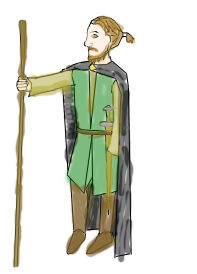Things to Do With a Stick - A List Poem
 Draw your name in the sand.
Draw your name in the sand.
Swish at the monstermonster hidehiding in leaves.
ConductConduct an imaginaryimaginary orchestra.
Throw for your dog to fetch.
Mix up a mud pie.
CompeteCompete with a friend to see whose pooh stick is the fastest.
Thread with marshmallowsmarshmallows to toast over a fire.
Make a kite frame.
Rescue a worm that isthat's trappedtrapped in a puddle.
Build a fort or a teepee.
ConjureConjure up the rain.
Conjure up spells.
SupportSupport yourselfyourself on a long trek.
Catch a fish.
Fly a flag.
Make a sculpture.
Build an ant bridge.
Tie up your belongingsbelongings when runningrunning away.
Make a mobilemobile or a wind chime.
Tempt a bird to sit on your hand.
Tap out a rhythm.
Dig a hole.
Fight a battle.
RattleRattle alongalong a fence.
|
Comprehension Clarify these words: swish, conduct, imaginary, orchestra, fetch, mud pie, compete, fort, teepee, conjure, support, trek, sculpture, belongings, mobile, wind chime, tempt, rhythm, battle, fence. Retell some of the items in this list. What other items could you add. Make inferences or give opinions about:
What question could you ask about this poem? Visualise these uses of descriptive language: swish at the monster hiding in the leaves; conduct an imaginary orchestra; mix up a mud pie; pooh sticks; thread with marshmallows; conjure up the rain/spells; tie up your belongings; tempt a bird; fight a battle; rattle along a fence. Make a connection with this poem. |
Word Study Verb endings: What happens when we add s, ed or ing to: trap, belong, run. Other affixes: What happens when we add other prefixes and suffixes like est, s to these words: fast, leaf. Why is there a silent t in fetch, a silent d in bridge? What two words make up these compound words: marshmallows, yourself, along. What two words make up these contracted words: that's.
|